Analyzing Behavior Through Classical Conditioning: PSYC 1000 Essay
VerifiedAdded on 2022/09/18
|9
|1758
|22
Essay
AI Summary
This essay critically examines the student's behavior, analyzing it through the framework of classical conditioning. The paper begins with an overview of classical conditioning, including Pavlov's discovery and the key components: unconditioned stimulus (UCS), unconditioned response (UCR), conditioned stimulus (CS), and conditioned response (CR). The student then identifies listening to music as a conditioned stimulus and playing basketball as an unconditioned stimulus, detailing how these experiences have shaped their behavior, leading to feelings of energy and being upbeat. The essay also explores how the student's behavior aligns with these concepts. Furthermore, the essay offers an alternative explanation for the observed behavior, considering cognitive influences. The conclusion summarizes the student's understanding of classical conditioning and its application to their personal experiences, highlighting the impact of the learning process on behavior. The essay also suggests further avenues for exploration, such as the relationship of other learning theories to different practices.
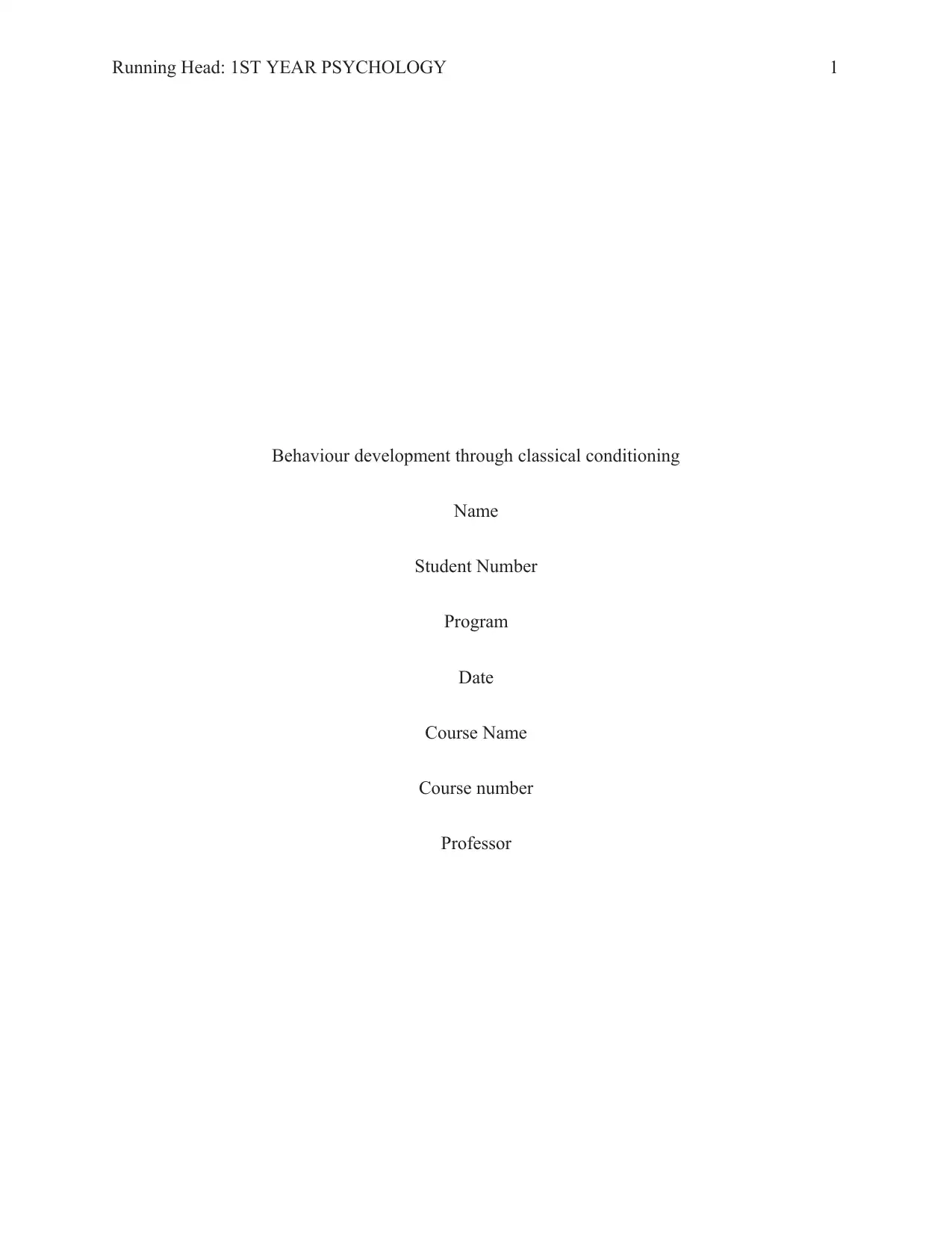
Running Head: 1ST YEAR PSYCHOLOGY 1
Behaviour development through classical conditioning
Name
Student Number
Program
Date
Course Name
Course number
Professor
Behaviour development through classical conditioning
Name
Student Number
Program
Date
Course Name
Course number
Professor
Paraphrase This Document
Need a fresh take? Get an instant paraphrase of this document with our AI Paraphraser
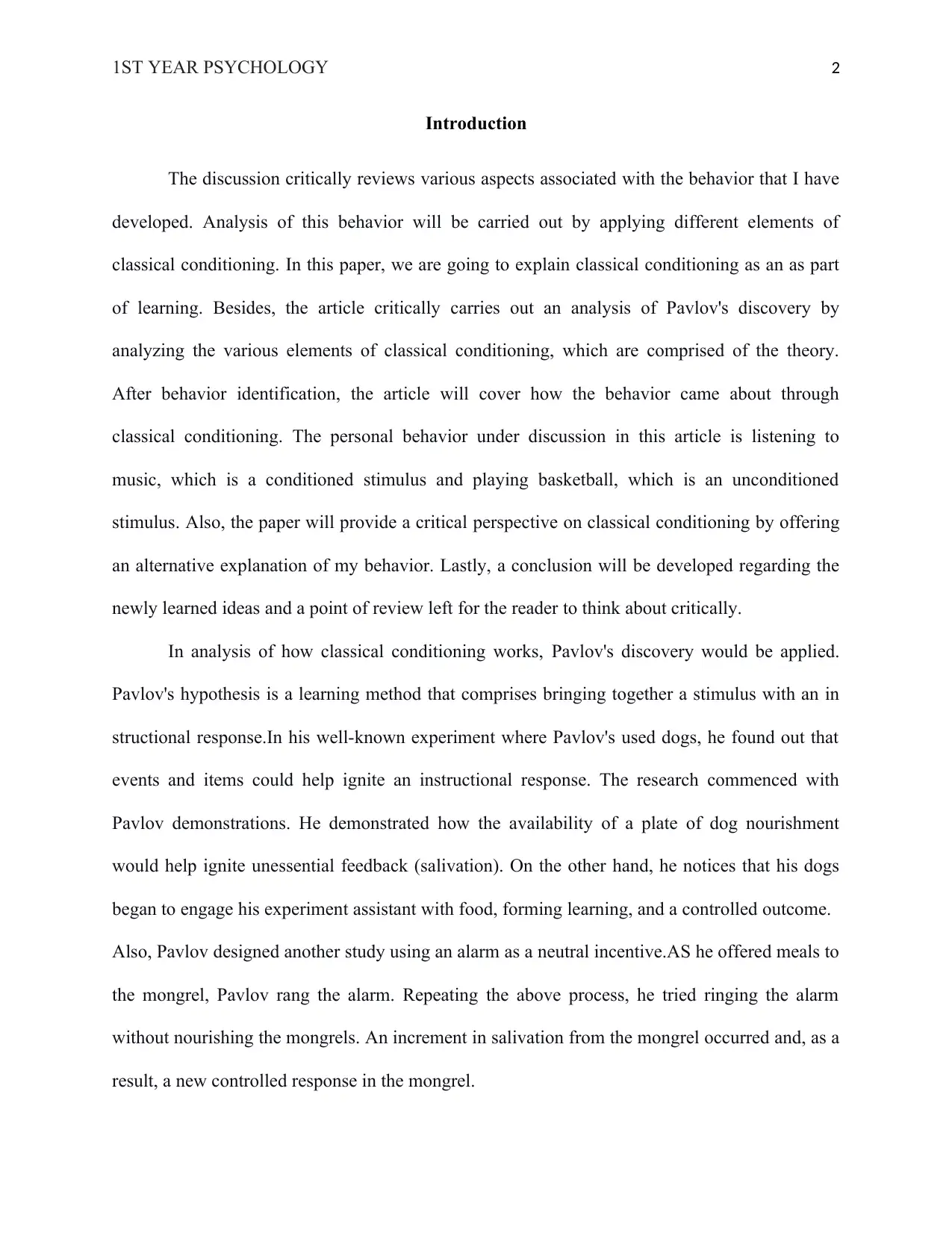
1ST YEAR PSYCHOLOGY 2
Introduction
The discussion critically reviews various aspects associated with the behavior that I have
developed. Analysis of this behavior will be carried out by applying different elements of
classical conditioning. In this paper, we are going to explain classical conditioning as an as part
of learning. Besides, the article critically carries out an analysis of Pavlov's discovery by
analyzing the various elements of classical conditioning, which are comprised of the theory.
After behavior identification, the article will cover how the behavior came about through
classical conditioning. The personal behavior under discussion in this article is listening to
music, which is a conditioned stimulus and playing basketball, which is an unconditioned
stimulus. Also, the paper will provide a critical perspective on classical conditioning by offering
an alternative explanation of my behavior. Lastly, a conclusion will be developed regarding the
newly learned ideas and a point of review left for the reader to think about critically.
In analysis of how classical conditioning works, Pavlov's discovery would be applied.
Pavlov's hypothesis is a learning method that comprises bringing together a stimulus with an in
structional response.In his well-known experiment where Pavlov's used dogs, he found out that
events and items could help ignite an instructional response. The research commenced with
Pavlov demonstrations. He demonstrated how the availability of a plate of dog nourishment
would help ignite unessential feedback (salivation). On the other hand, he notices that his dogs
began to engage his experiment assistant with food, forming learning, and a controlled outcome.
Also, Pavlov designed another study using an alarm as a neutral incentive.AS he offered meals to
the mongrel, Pavlov rang the alarm. Repeating the above process, he tried ringing the alarm
without nourishing the mongrels. An increment in salivation from the mongrel occurred and, as a
result, a new controlled response in the mongrel.
Introduction
The discussion critically reviews various aspects associated with the behavior that I have
developed. Analysis of this behavior will be carried out by applying different elements of
classical conditioning. In this paper, we are going to explain classical conditioning as an as part
of learning. Besides, the article critically carries out an analysis of Pavlov's discovery by
analyzing the various elements of classical conditioning, which are comprised of the theory.
After behavior identification, the article will cover how the behavior came about through
classical conditioning. The personal behavior under discussion in this article is listening to
music, which is a conditioned stimulus and playing basketball, which is an unconditioned
stimulus. Also, the paper will provide a critical perspective on classical conditioning by offering
an alternative explanation of my behavior. Lastly, a conclusion will be developed regarding the
newly learned ideas and a point of review left for the reader to think about critically.
In analysis of how classical conditioning works, Pavlov's discovery would be applied.
Pavlov's hypothesis is a learning method that comprises bringing together a stimulus with an in
structional response.In his well-known experiment where Pavlov's used dogs, he found out that
events and items could help ignite an instructional response. The research commenced with
Pavlov demonstrations. He demonstrated how the availability of a plate of dog nourishment
would help ignite unessential feedback (salivation). On the other hand, he notices that his dogs
began to engage his experiment assistant with food, forming learning, and a controlled outcome.
Also, Pavlov designed another study using an alarm as a neutral incentive.AS he offered meals to
the mongrel, Pavlov rang the alarm. Repeating the above process, he tried ringing the alarm
without nourishing the mongrels. An increment in salivation from the mongrel occurred and, as a
result, a new controlled response in the mongrel.
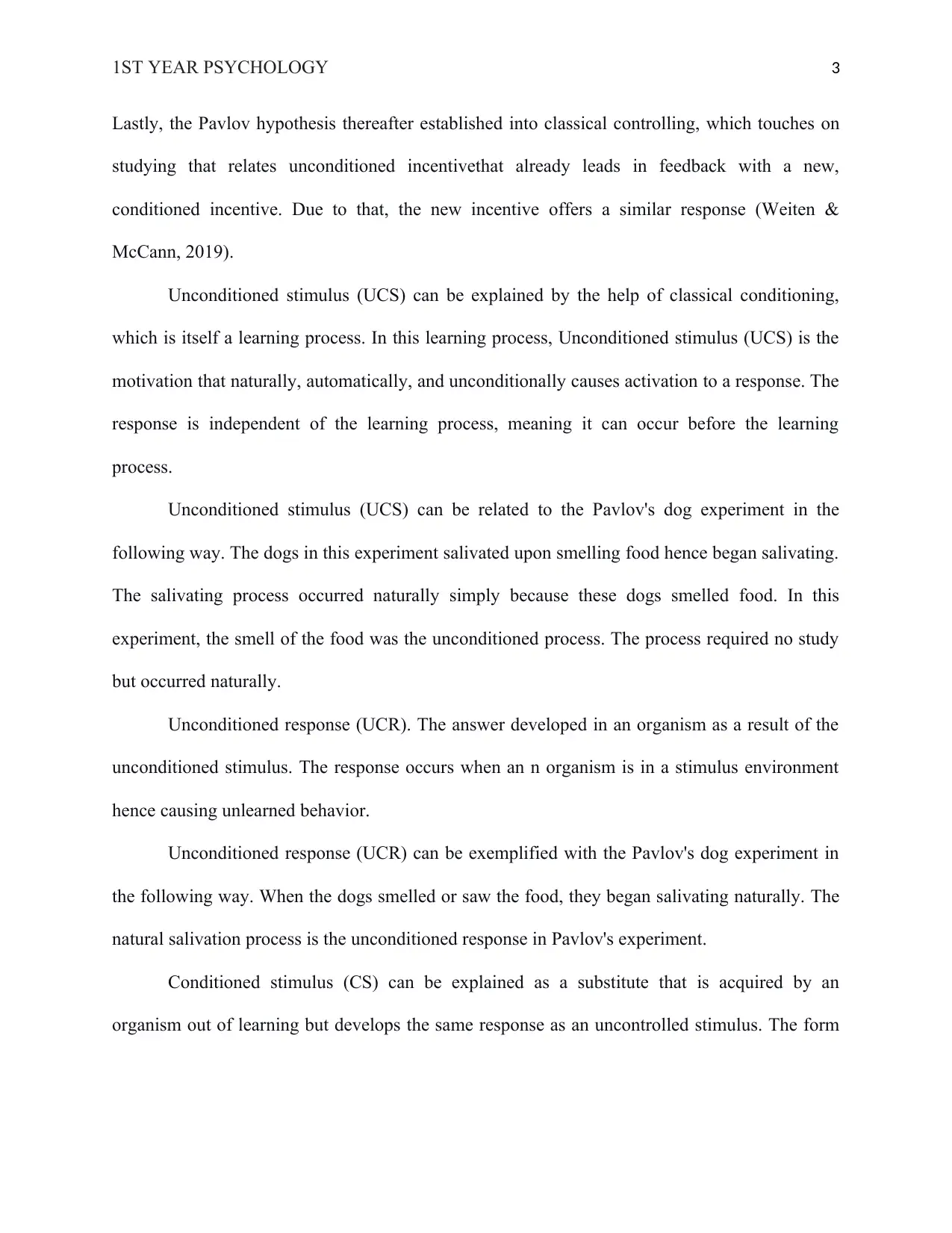
1ST YEAR PSYCHOLOGY 3
Lastly, the Pavlov hypothesis thereafter established into classical controlling, which touches on
studying that relates unconditioned incentivethat already leads in feedback with a new,
conditioned incentive. Due to that, the new incentive offers a similar response (Weiten &
McCann, 2019).
Unconditioned stimulus (UCS) can be explained by the help of classical conditioning,
which is itself a learning process. In this learning process, Unconditioned stimulus (UCS) is the
motivation that naturally, automatically, and unconditionally causes activation to a response. The
response is independent of the learning process, meaning it can occur before the learning
process.
Unconditioned stimulus (UCS) can be related to the Pavlov's dog experiment in the
following way. The dogs in this experiment salivated upon smelling food hence began salivating.
The salivating process occurred naturally simply because these dogs smelled food. In this
experiment, the smell of the food was the unconditioned process. The process required no study
but occurred naturally.
Unconditioned response (UCR). The answer developed in an organism as a result of the
unconditioned stimulus. The response occurs when an n organism is in a stimulus environment
hence causing unlearned behavior.
Unconditioned response (UCR) can be exemplified with the Pavlov's dog experiment in
the following way. When the dogs smelled or saw the food, they began salivating naturally. The
natural salivation process is the unconditioned response in Pavlov's experiment.
Conditioned stimulus (CS) can be explained as a substitute that is acquired by an
organism out of learning but develops the same response as an uncontrolled stimulus. The form
Lastly, the Pavlov hypothesis thereafter established into classical controlling, which touches on
studying that relates unconditioned incentivethat already leads in feedback with a new,
conditioned incentive. Due to that, the new incentive offers a similar response (Weiten &
McCann, 2019).
Unconditioned stimulus (UCS) can be explained by the help of classical conditioning,
which is itself a learning process. In this learning process, Unconditioned stimulus (UCS) is the
motivation that naturally, automatically, and unconditionally causes activation to a response. The
response is independent of the learning process, meaning it can occur before the learning
process.
Unconditioned stimulus (UCS) can be related to the Pavlov's dog experiment in the
following way. The dogs in this experiment salivated upon smelling food hence began salivating.
The salivating process occurred naturally simply because these dogs smelled food. In this
experiment, the smell of the food was the unconditioned process. The process required no study
but occurred naturally.
Unconditioned response (UCR). The answer developed in an organism as a result of the
unconditioned stimulus. The response occurs when an n organism is in a stimulus environment
hence causing unlearned behavior.
Unconditioned response (UCR) can be exemplified with the Pavlov's dog experiment in
the following way. When the dogs smelled or saw the food, they began salivating naturally. The
natural salivation process is the unconditioned response in Pavlov's experiment.
Conditioned stimulus (CS) can be explained as a substitute that is acquired by an
organism out of learning but develops the same response as an uncontrolled stimulus. The form
⊘ This is a preview!⊘
Do you want full access?
Subscribe today to unlock all pages.

Trusted by 1+ million students worldwide
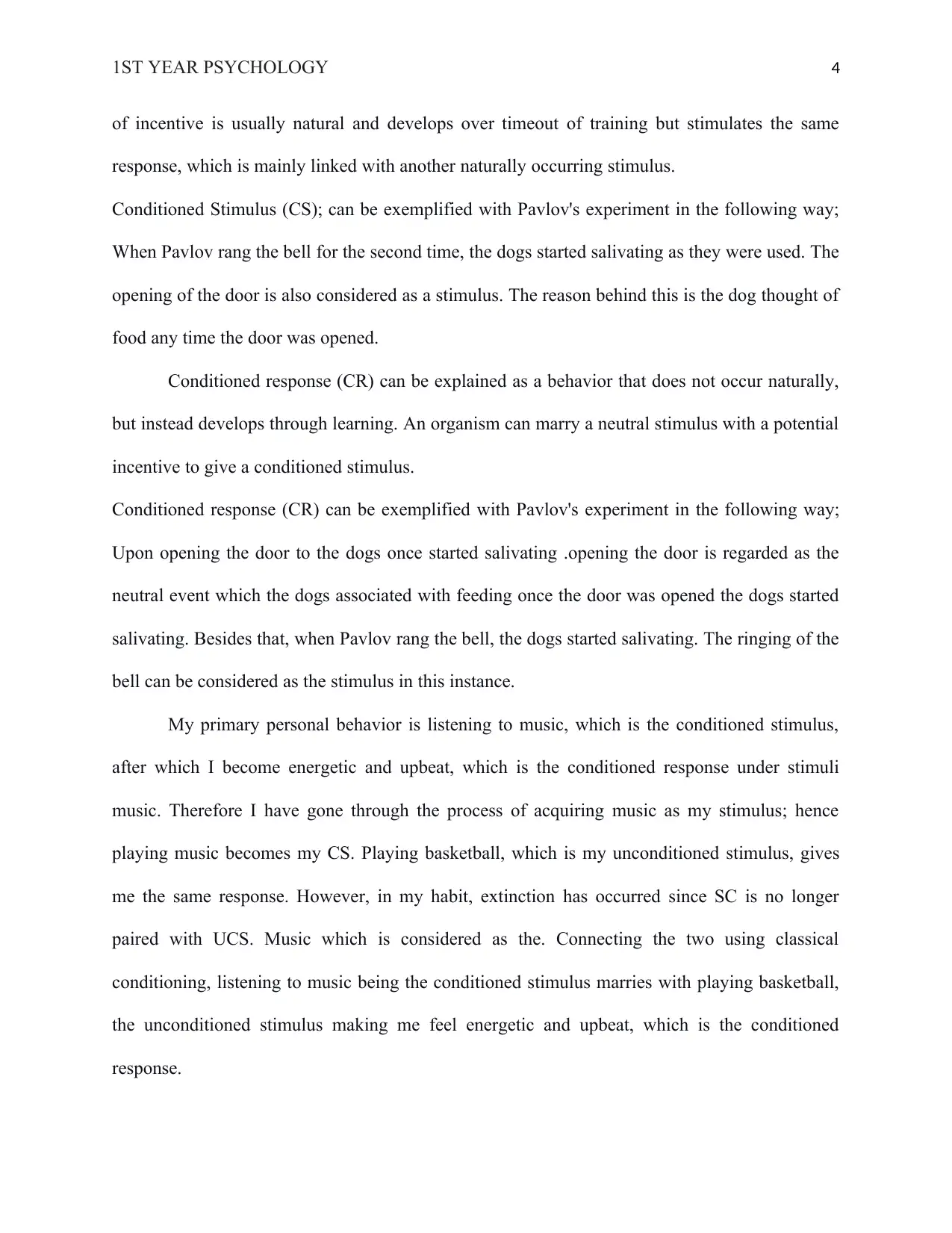
1ST YEAR PSYCHOLOGY 4
of incentive is usually natural and develops over timeout of training but stimulates the same
response, which is mainly linked with another naturally occurring stimulus.
Conditioned Stimulus (CS); can be exemplified with Pavlov's experiment in the following way;
When Pavlov rang the bell for the second time, the dogs started salivating as they were used. The
opening of the door is also considered as a stimulus. The reason behind this is the dog thought of
food any time the door was opened.
Conditioned response (CR) can be explained as a behavior that does not occur naturally,
but instead develops through learning. An organism can marry a neutral stimulus with a potential
incentive to give a conditioned stimulus.
Conditioned response (CR) can be exemplified with Pavlov's experiment in the following way;
Upon opening the door to the dogs once started salivating .opening the door is regarded as the
neutral event which the dogs associated with feeding once the door was opened the dogs started
salivating. Besides that, when Pavlov rang the bell, the dogs started salivating. The ringing of the
bell can be considered as the stimulus in this instance.
My primary personal behavior is listening to music, which is the conditioned stimulus,
after which I become energetic and upbeat, which is the conditioned response under stimuli
music. Therefore I have gone through the process of acquiring music as my stimulus; hence
playing music becomes my CS. Playing basketball, which is my unconditioned stimulus, gives
me the same response. However, in my habit, extinction has occurred since SC is no longer
paired with UCS. Music which is considered as the. Connecting the two using classical
conditioning, listening to music being the conditioned stimulus marries with playing basketball,
the unconditioned stimulus making me feel energetic and upbeat, which is the conditioned
response.
of incentive is usually natural and develops over timeout of training but stimulates the same
response, which is mainly linked with another naturally occurring stimulus.
Conditioned Stimulus (CS); can be exemplified with Pavlov's experiment in the following way;
When Pavlov rang the bell for the second time, the dogs started salivating as they were used. The
opening of the door is also considered as a stimulus. The reason behind this is the dog thought of
food any time the door was opened.
Conditioned response (CR) can be explained as a behavior that does not occur naturally,
but instead develops through learning. An organism can marry a neutral stimulus with a potential
incentive to give a conditioned stimulus.
Conditioned response (CR) can be exemplified with Pavlov's experiment in the following way;
Upon opening the door to the dogs once started salivating .opening the door is regarded as the
neutral event which the dogs associated with feeding once the door was opened the dogs started
salivating. Besides that, when Pavlov rang the bell, the dogs started salivating. The ringing of the
bell can be considered as the stimulus in this instance.
My primary personal behavior is listening to music, which is the conditioned stimulus,
after which I become energetic and upbeat, which is the conditioned response under stimuli
music. Therefore I have gone through the process of acquiring music as my stimulus; hence
playing music becomes my CS. Playing basketball, which is my unconditioned stimulus, gives
me the same response. However, in my habit, extinction has occurred since SC is no longer
paired with UCS. Music which is considered as the. Connecting the two using classical
conditioning, listening to music being the conditioned stimulus marries with playing basketball,
the unconditioned stimulus making me feel energetic and upbeat, which is the conditioned
response.
Paraphrase This Document
Need a fresh take? Get an instant paraphrase of this document with our AI Paraphraser
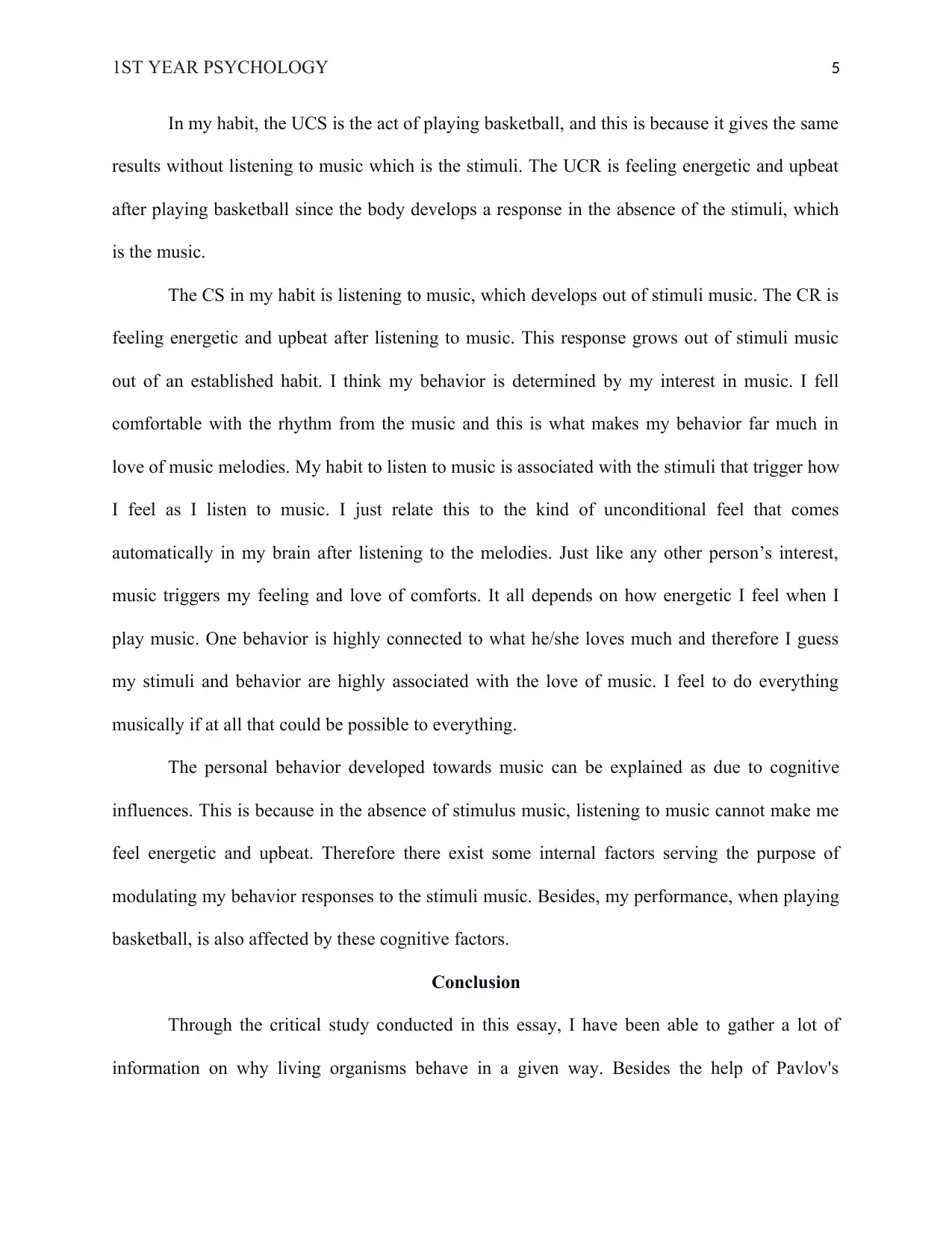
1ST YEAR PSYCHOLOGY 5
In my habit, the UCS is the act of playing basketball, and this is because it gives the same
results without listening to music which is the stimuli. The UCR is feeling energetic and upbeat
after playing basketball since the body develops a response in the absence of the stimuli, which
is the music.
The CS in my habit is listening to music, which develops out of stimuli music. The CR is
feeling energetic and upbeat after listening to music. This response grows out of stimuli music
out of an established habit. I think my behavior is determined by my interest in music. I fell
comfortable with the rhythm from the music and this is what makes my behavior far much in
love of music melodies. My habit to listen to music is associated with the stimuli that trigger how
I feel as I listen to music. I just relate this to the kind of unconditional feel that comes
automatically in my brain after listening to the melodies. Just like any other person’s interest,
music triggers my feeling and love of comforts. It all depends on how energetic I feel when I
play music. One behavior is highly connected to what he/she loves much and therefore I guess
my stimuli and behavior are highly associated with the love of music. I feel to do everything
musically if at all that could be possible to everything.
The personal behavior developed towards music can be explained as due to cognitive
influences. This is because in the absence of stimulus music, listening to music cannot make me
feel energetic and upbeat. Therefore there exist some internal factors serving the purpose of
modulating my behavior responses to the stimuli music. Besides, my performance, when playing
basketball, is also affected by these cognitive factors.
Conclusion
Through the critical study conducted in this essay, I have been able to gather a lot of
information on why living organisms behave in a given way. Besides the help of Pavlov's
In my habit, the UCS is the act of playing basketball, and this is because it gives the same
results without listening to music which is the stimuli. The UCR is feeling energetic and upbeat
after playing basketball since the body develops a response in the absence of the stimuli, which
is the music.
The CS in my habit is listening to music, which develops out of stimuli music. The CR is
feeling energetic and upbeat after listening to music. This response grows out of stimuli music
out of an established habit. I think my behavior is determined by my interest in music. I fell
comfortable with the rhythm from the music and this is what makes my behavior far much in
love of music melodies. My habit to listen to music is associated with the stimuli that trigger how
I feel as I listen to music. I just relate this to the kind of unconditional feel that comes
automatically in my brain after listening to the melodies. Just like any other person’s interest,
music triggers my feeling and love of comforts. It all depends on how energetic I feel when I
play music. One behavior is highly connected to what he/she loves much and therefore I guess
my stimuli and behavior are highly associated with the love of music. I feel to do everything
musically if at all that could be possible to everything.
The personal behavior developed towards music can be explained as due to cognitive
influences. This is because in the absence of stimulus music, listening to music cannot make me
feel energetic and upbeat. Therefore there exist some internal factors serving the purpose of
modulating my behavior responses to the stimuli music. Besides, my performance, when playing
basketball, is also affected by these cognitive factors.
Conclusion
Through the critical study conducted in this essay, I have been able to gather a lot of
information on why living organisms behave in a given way. Besides the help of Pavlov's
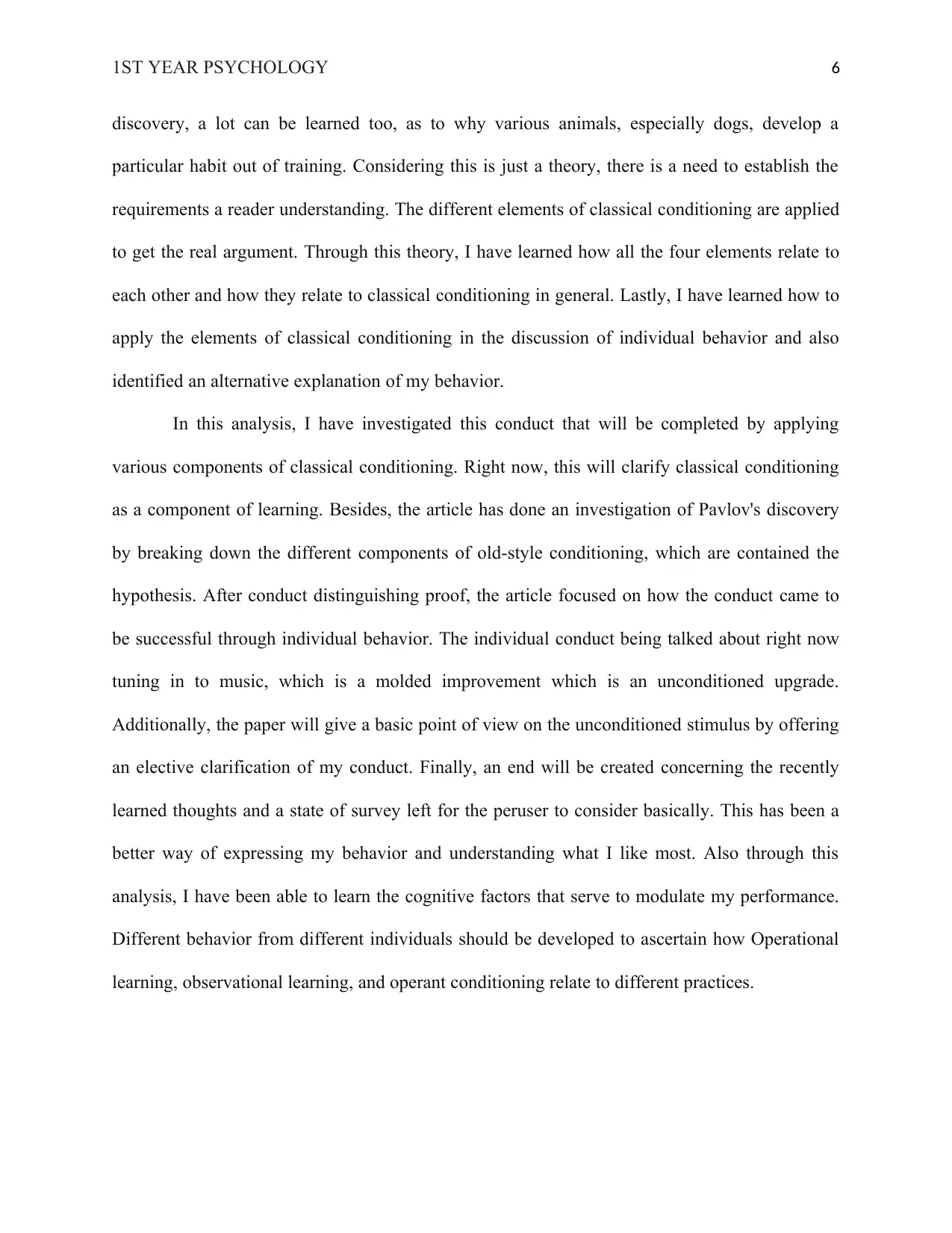
1ST YEAR PSYCHOLOGY 6
discovery, a lot can be learned too, as to why various animals, especially dogs, develop a
particular habit out of training. Considering this is just a theory, there is a need to establish the
requirements a reader understanding. The different elements of classical conditioning are applied
to get the real argument. Through this theory, I have learned how all the four elements relate to
each other and how they relate to classical conditioning in general. Lastly, I have learned how to
apply the elements of classical conditioning in the discussion of individual behavior and also
identified an alternative explanation of my behavior.
In this analysis, I have investigated this conduct that will be completed by applying
various components of classical conditioning. Right now, this will clarify classical conditioning
as a component of learning. Besides, the article has done an investigation of Pavlov's discovery
by breaking down the different components of old-style conditioning, which are contained the
hypothesis. After conduct distinguishing proof, the article focused on how the conduct came to
be successful through individual behavior. The individual conduct being talked about right now
tuning in to music, which is a molded improvement which is an unconditioned upgrade.
Additionally, the paper will give a basic point of view on the unconditioned stimulus by offering
an elective clarification of my conduct. Finally, an end will be created concerning the recently
learned thoughts and a state of survey left for the peruser to consider basically. This has been a
better way of expressing my behavior and understanding what I like most. Also through this
analysis, I have been able to learn the cognitive factors that serve to modulate my performance.
Different behavior from different individuals should be developed to ascertain how Operational
learning, observational learning, and operant conditioning relate to different practices.
discovery, a lot can be learned too, as to why various animals, especially dogs, develop a
particular habit out of training. Considering this is just a theory, there is a need to establish the
requirements a reader understanding. The different elements of classical conditioning are applied
to get the real argument. Through this theory, I have learned how all the four elements relate to
each other and how they relate to classical conditioning in general. Lastly, I have learned how to
apply the elements of classical conditioning in the discussion of individual behavior and also
identified an alternative explanation of my behavior.
In this analysis, I have investigated this conduct that will be completed by applying
various components of classical conditioning. Right now, this will clarify classical conditioning
as a component of learning. Besides, the article has done an investigation of Pavlov's discovery
by breaking down the different components of old-style conditioning, which are contained the
hypothesis. After conduct distinguishing proof, the article focused on how the conduct came to
be successful through individual behavior. The individual conduct being talked about right now
tuning in to music, which is a molded improvement which is an unconditioned upgrade.
Additionally, the paper will give a basic point of view on the unconditioned stimulus by offering
an elective clarification of my conduct. Finally, an end will be created concerning the recently
learned thoughts and a state of survey left for the peruser to consider basically. This has been a
better way of expressing my behavior and understanding what I like most. Also through this
analysis, I have been able to learn the cognitive factors that serve to modulate my performance.
Different behavior from different individuals should be developed to ascertain how Operational
learning, observational learning, and operant conditioning relate to different practices.
⊘ This is a preview!⊘
Do you want full access?
Subscribe today to unlock all pages.

Trusted by 1+ million students worldwide
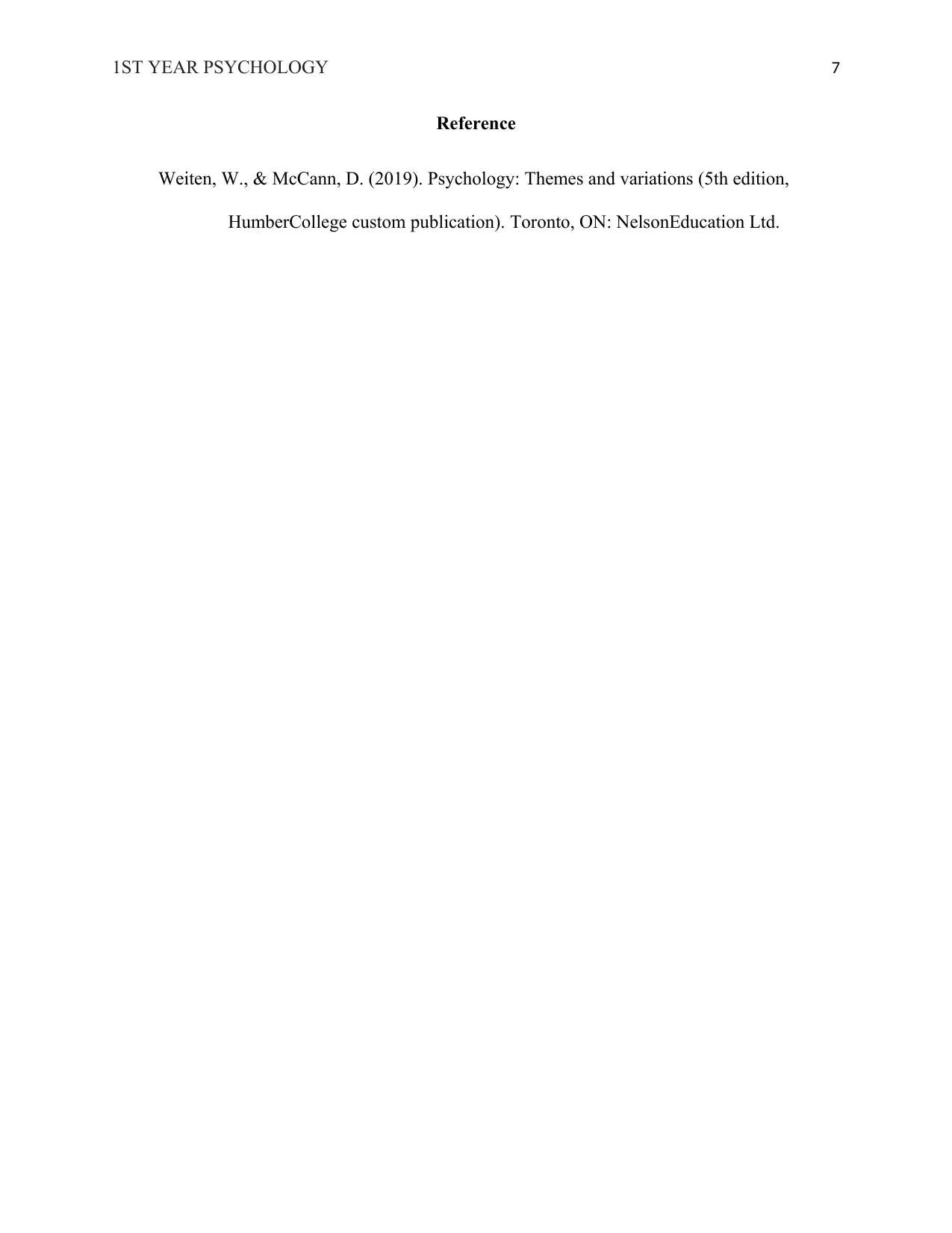
1ST YEAR PSYCHOLOGY 7
Reference
Weiten, W., & McCann, D. (2019). Psychology: Themes and variations (5th edition,
HumberCollege custom publication). Toronto, ON: NelsonEducation Ltd.
Reference
Weiten, W., & McCann, D. (2019). Psychology: Themes and variations (5th edition,
HumberCollege custom publication). Toronto, ON: NelsonEducation Ltd.
Paraphrase This Document
Need a fresh take? Get an instant paraphrase of this document with our AI Paraphraser
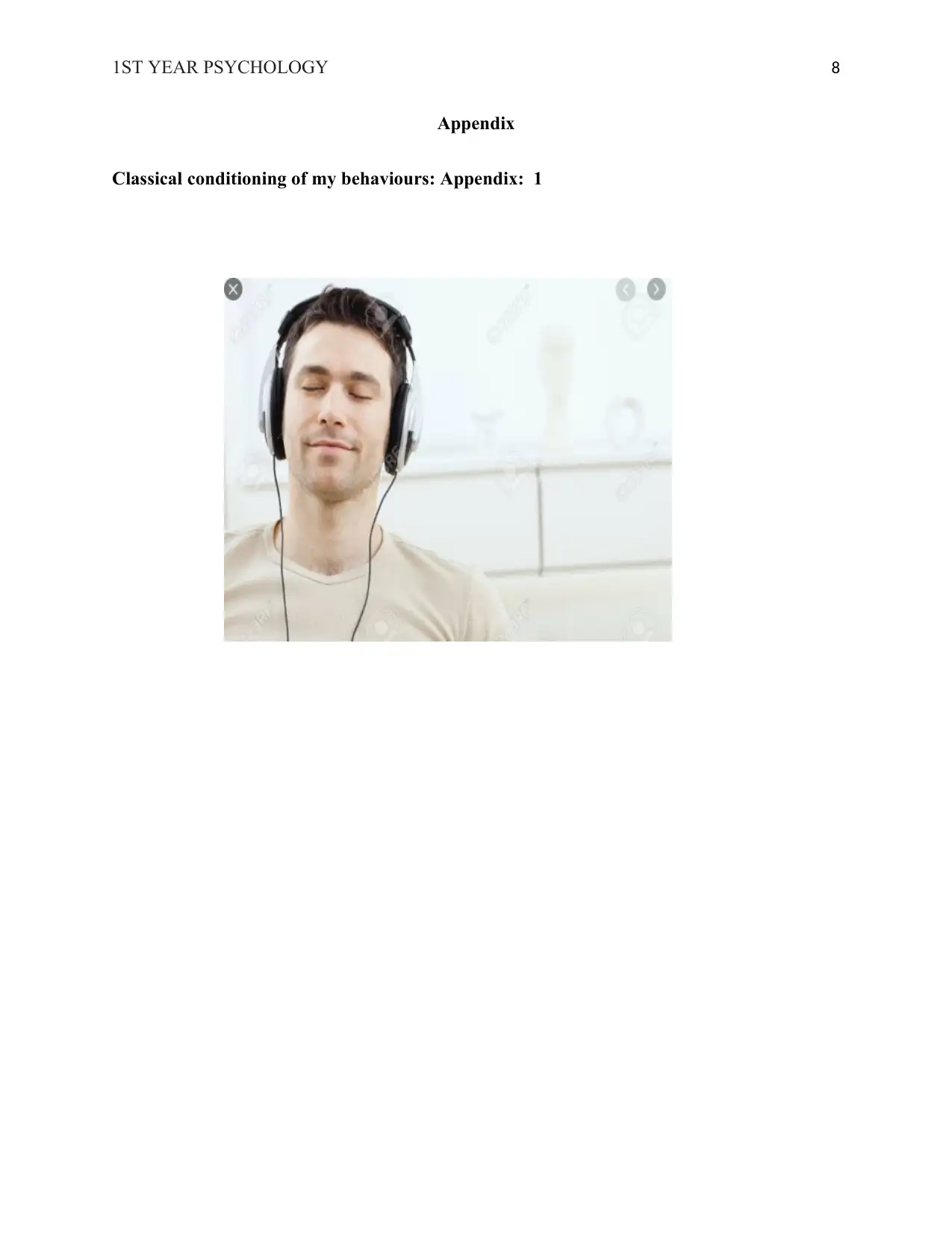
1ST YEAR PSYCHOLOGY 8
Appendix
Classical conditioning of my behaviours: Appendix: 1
Appendix
Classical conditioning of my behaviours: Appendix: 1
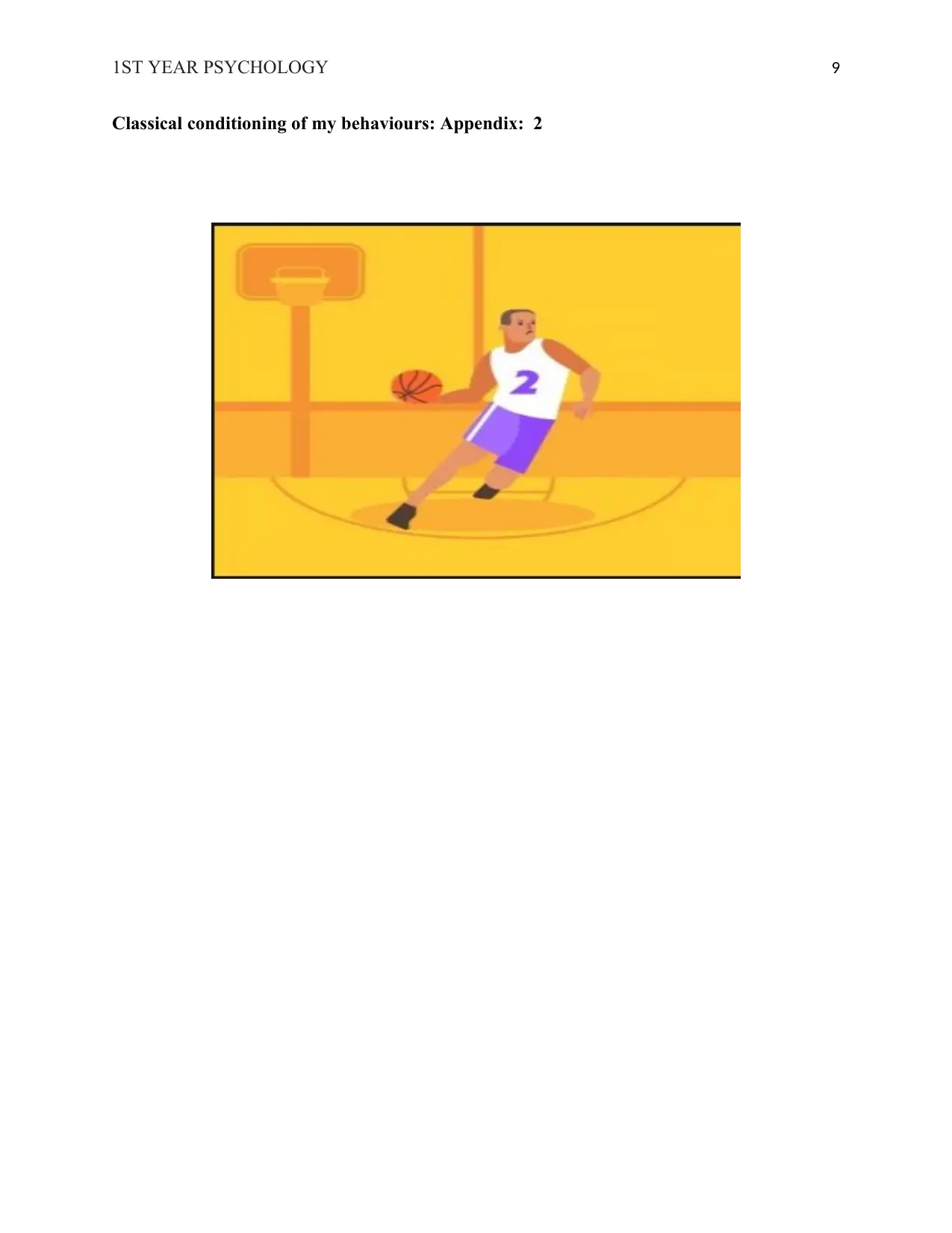
1ST YEAR PSYCHOLOGY 9
Classical conditioning of my behaviours: Appendix: 2
Classical conditioning of my behaviours: Appendix: 2
⊘ This is a preview!⊘
Do you want full access?
Subscribe today to unlock all pages.

Trusted by 1+ million students worldwide
1 out of 9
Related Documents
Your All-in-One AI-Powered Toolkit for Academic Success.
+13062052269
info@desklib.com
Available 24*7 on WhatsApp / Email
![[object Object]](/_next/static/media/star-bottom.7253800d.svg)
Unlock your academic potential
Copyright © 2020–2026 A2Z Services. All Rights Reserved. Developed and managed by ZUCOL.





